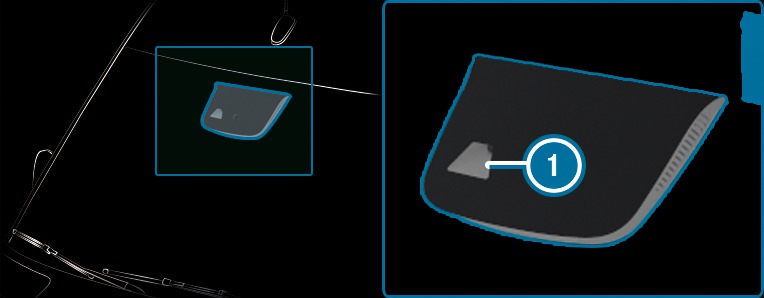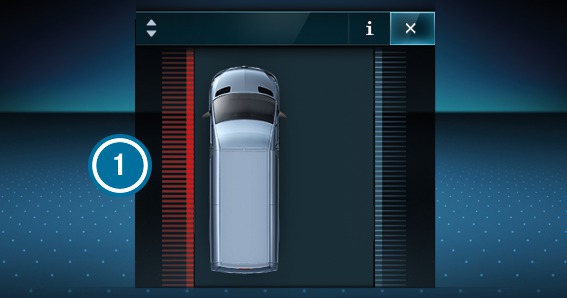
Active Lane Keeping Assist monitors the area in front of your vehicle by means of multifunction camera  . It serves to protect you against unintentionally leaving your lane. You may also be warned by a noticeable vibration in the steering wheel or by a warning tone and by the status symbol flashing in the instrument cluster. In addition, you may be guided back into your lane by a lane-correcting brake application. A corresponding message appears in the instrument cluster.
. It serves to protect you against unintentionally leaving your lane. You may also be warned by a noticeable vibration in the steering wheel or by a warning tone and by the status symbol flashing in the instrument cluster. In addition, you may be guided back into your lane by a lane-correcting brake application. A corresponding message appears in the instrument cluster.
The driving system detects lane markings.
If a front wheel drives over lane markings.
Active Lane Keeping Assist detects lane markings on both sides of the vehicle.
A front wheel drives over a solid lane marking.
A corresponding message appears in the instrument cluster.
The brake application is available in the speed range between approximately 60 km/h and 160 km/h.
You can either deactivate the Active Lane Keeping Assist warning or switch off the system completely.
If you fail to adapt your driving style, Active Lane Keeping Assist can neither reduce the risk of an accident nor override the laws of physics. It cannot take into account road, weather or traffic conditions. The driving system is an aid for when you unintentionally leave or cross the lane and not a system for automatically keeping to the lane. You are responsible for the distance to the vehicle in front, for vehicle speed, braking in good time and for staying in your lane.

If a lane-correcting brake application from Active Lane Keeping Assist occurs, display  appears in the instrument cluster display.
appears in the instrument cluster display.
You clearly and actively steer, brake or accelerate.
You switch on the turn signal.
A driving safety system intervenes, e.g. ESP® or Active Brake Assist.
You have adopted a sporty driving style with high cornering speeds or high rates of acceleration.
ESP® has been switched off.
When driving with a trailer, the electrical connection to the trailer has been correctly established.
If a loss of tyre pressure or a defective tyre has been detected and displayed.
If there is poor visibility, e.g. due to insufficient illumination of the road, if there are highly variable shade conditions or in rain, snow, fog or spray.
Glare from oncoming traffic, direct sunlight or reflections.
There is dirt on the windscreen in the vicinity of the multifunction camera or the camera is misted up, damaged or obscured.
No or several unclear lane markings are present for one lane, e.g. in a construction area.
If the lane markings are worn away, dark or covered up.
The distance to the vehicle in front is too short and thus the lane markings cannot be detected.
The lane markings change quickly, e.g. lanes branch off, cross one another or merge.
The carriageway is very narrow and winding.

